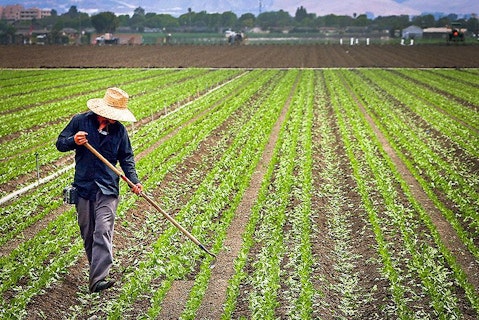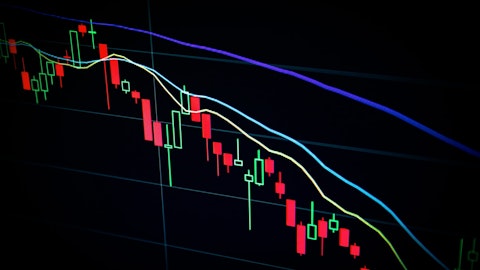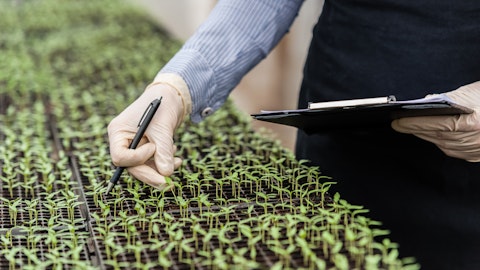In this article, we shall cover the 15 biggest agricultural companies in the US. To skip our detailed analysis of some of the risks and potentials affecting the American agricultural industry in 2023, go directly and see 5 Biggest Agricultural Companies in the US.
According to an outlook presented by the US Department of Agriculture in 2023, the US agricultural GDP is expected to reach up to $173 billion by 2026, up 0.6% annually since 2021. The market is estimated to have grown more than 2% year-on-year since 2002. Some of the biggest agricultural companies in the American market today are Archer-Daniels-Midland (NYSE:ADM), Bunge Ltd. (NYSE:BG), and Tyson Foods Inc. (NYSE:TSN).
Despite such impressive statistics, a recent article by McKinsey posits that even the biggest agricultural companies in the US are currently under immense pressure. Across the world, farmers complain that prices for agricultural input like fertilizer and crop protection chemicals are at an all-time high, currently rising by more than 250% over the past couple of years. Moreover, the exacerbation of the climate change crisis is introducing further problems, as rising temperatures are leading to increased weather variability, more frequent acute conditions, longer periods of drought, and new species of invasive crops and pests, all of which collectively is significantly reducing annual yields. In the American Southwest, for example, there is a massive drought underway for the past 20 years, and experts have claimed that the the 21st century has been the region’s driest time period in at least 1200 years.
Agricultural Automation Trends: An Overview
According to McKinsey, to release the increasing pressure on the agricultural industry in 2023 and to maintain economic viability, farmers are resorting to innovative, technological solutions. In this vein, automation is showing significant promise in curtailing the effects of the climate crisis and aiding agriculturalists mitigate the resulting financial blow. Automated farming solutions tend to exist on a diverse spectrum, ranging from semi-automated technologies like assisted steering to entirely automated systems like weeding robots, each requiring varying levels of operator support. The next generation of automated technology is using a combination of sensors, analytics, robotics, and equipment to help farmers make more informed decisions on the field and capitalize on all available resources. Furthermore, the advent of artificial intelligence presents significant potential to automate decision-making using comprehensive sets of already-attained data points. Automated technology presents significant upside to row and specialty crop producers. For example, the use of automated systems in agriculture presents an upside of more than $400 per acre per year, nearly quadrupling returns on farmers’ investments. Therefore, some of the biggest agricultural companies in the US like Archer-Daniels-Midland (NYSE:ADM), Bunge Ltd. (NYSE:BG), and Tyson Foods Inc. (NYSE:TSN) have already begun a process of integrating and incorporating automated technological solutions to their operations.
However, according to McKinsey’s Farmers Global Insights Survey 2022, less than 5 percent of farmers in North America are adequately investing in next generation technology. In the survey, McKinsey also highlights certain trends prevalent in the agricultural sector in 2023 which are likely to propel the adoption of automated technology in agricultural practice.
A trend which is almost immediately evident is that farm economics are a constant source of trepidation for farmers. Automation can aid primarily in two fundamental respects. Firstly, since supply chain disruptions and geopolitical challenges have caused the prices of fertilizers and crop protection chemicals to skyrocket by more than 15% globally over five years, US farmers have begun to cite input costs as the number one risk to their profitability, according to the survey. To read more about the price hike in the fertilizer segment of the agriculture industry, check out our article on 10 Best Fertilizer Stocks to Buy According to Hedge Funds. Secondly, labor challenges are also proving to be a constant pain point for farmers, especially since farmworkers are at high risk of injuries and have one of the highest fatal occupational injury rates in the United States. Furthermore, prolonged exposure to chemicals and sun also adds to the perception that farm work is inherently dangerous. These labor shortages – especially in the United States where more than 22 million pounds of fruits and vegetables were wasted in 2022 due to worker shortage – have caused farmworker wages to rise by roughly four percent annually between 2015 to 2022. Automation can help ease these challenges significantly.
Digitization in Agriculture: A Sustainable Approach
According to an article by McKinsey, agricultural land covers more than half of habitable land around the world and is responsible for more than seventy percent of freshwater withdrawal. Furthermore, food systems are the leading cause of biodiversity loss and have increasingly begun to negatively impact biosphere integrity, human health, and food access. In 2019, the global agriculture industry accounted for more than thirty percent of human-caused greenhouse gas emissions, making them a critical focus for meeting bold climate targets. Hence, as the climate crisis assumes a higher priority for governments globally, investors are increasingly focused on companies like Archer-Daniels-Midland (NYSE:ADM), Bunge Ltd. (NYSE:BG), and Tyson Foods Inc. (NYSE:TSN), which have begun to implement sustainable transitions to curb agriculture’s effects on nature and society beyond climate change.
According to the article, achieving the objective of a 1.5° pathway will require actions by the biggest agricultural companies that extend throughout the value chain. Some of the more important actions to take are reducing food loss and waste, adopting dietary shifts, and adapting to a more sustainable usage of arable land, all of which are absolutely integral to decarbonization efforts. According to an article by Bloomberg, digital services have a strong interconnection with sustainability efforts in agriculture. As the public eye increasingly focuses on the environmental footprint of the agricultural sector, digital service providers are flocking in to market their platform’s sustainability capabilities. The article posits that as farmers use digital services to monitor the administration of fertilizer, crop chemicals, and water, the efficiency of the entire process is substantially enhanced, thereby reducing the impact on emissions and ecology.
In this effort, Bloomberg conducted a survey of digital platform owners, who maintained that digital monitoring of farming is essential to prove at scale the certification of regenerative farming practices that enhance soil health, organic carbon in the soil, and biodiversity promotion. Digitization of the farming process can also ensure supply chain transparency to promote sustainability and outcome-based pricing models, which incentivize a profound reduction in the use of agrochemicals.

Pixabay/Public Domain
Our Methodology
To compile our list of the 15 biggest agricultural companies companies in the U.S, we decided to look at a mix of both private and public companies. We looked at more than 120 companies in the US that operate within the agricultural sector and determined the revenue of each company. For public companies, we sifted through the income statements of each company to determine their annual revenue in 2022. The revenue of private companies that haven’t made their data public has been estimated based on various sources like Forbes, Crunchbase, and Fortune. Then, we selected 15 companies with the highest annual revenue in 2022 and subsequently ranked them from lowest to highest.
To read about some of the largest global players in the agricultural sector, check out our coverage of the 12 Biggest Agricultural Companies in the World.
Biggest Agricultural Companies in the US
15. Dole PLC (NYSE:DOLE)
Annual Revenue: $9.22B
Dole plc (NYSE:DOLE) is an Irish-American agricultural multinational corporation, which despite being headquartered in Dublin, was founded in Hawaii in 1851. As of 2023, it is one of the largest producers of fruit and vegetables in the world, operating with more than 40,000 full-time and seasonal employees. In 2022, Dole (NYSE:DOLE) reported an annual revenue of of $9.22 billion, making it one of the biggest agricultural companies in the US. As of 2023, in addition to 110,000 acres of farmland, the company also has more than 250 processing plants and distribution centers across the world.
14. CF Industries Holdings Inc. (NYSE:CF)
Annual Revenue: $11.2B
Based in Deerfield, Illinois, CF Industries Holdings Inc. (NYSE:CF) is an American agribusiness company which focuses on the manufacture and distribution of agricultural fertilizers, including ammonia, urea, and ammonium nitrate. The company operates more than ten manufacturing complexes around the world, comprising more than 16 ammonia plants. CF Industries Holdings Inc. (NYSE:CF) boasts one of the strongest market positions in the American agriculture industry. Investors are flocking towards the stock, primarily due to four main reasons, namely the super abundance of corn which is expected to drive demand for nitrogen-based fertilizers, the current dip in natural gas prices, the availability of carbon-free ammonia, and exceptionally robust fundamentals.
13. Seaboard Corporation (NYSE:SEB)
Annual Revenue: $11.24B
Headquartered in Marriam, Kansas, Seaboard Corp (NYSE:SEB) is a diverse multinational agribusiness and transportation conglomerate. The company has integrated operations in a variety of industries. In the United States however, Seaboard Corp (NYSE:SEB) primarily focuses on pork production, grain processing, sugar production, and commodity merchandising. The company produces more than five million hogs annually. Like Archer-Daniels-Midland (NYSE:ADM), Bunge Ltd. (NYSE:BG), and Tyson Foods Inc. (NYSE:TSN), Seaboard Corp (NYSE:SEB) is one of the biggest agricultural companies in the US.
12. AGCO Corp. (NYSE:AGCO)
Annual Revenue: $12.7B
Headquartered in Duluth, Georgia, AGCO Corp. (NYSE:AGCO) is an American company which focuses on the manufacture and sale of agricultural machinery. Founded in 1990, AGCO Corp. (NYSE:AGCO) designs, produces, and sells tractors, combines, foragers, hay tools, self-propelled sprayers, smart farming technologies, seeding equipment, and tillage equipment. In May 2022, the company acquired JCA Industries, a Canadian company which specialized in the production of autonomous software for agricultural machines and electronic system components. AGCO Corp. (NYSE:AGCO) has more than 19 manufacturing sites located across the world.
11. Land O’Lakes Inc.
Annual Revenue: $14.9B
Based in Arden Hills, Minnesota, Land O’Lakes Inc. is an American member-owned agricultural cooperative which largely reserves its focus on the dairy industry. The cooperative has more than 1900 direct producer-members, 750 member-cooperatives and about 9500 employees as of 2023. Land O’Lakes Inc. is one of the largest producers of butter and cheese in the United States.
10. Corteva Inc. (NYSE:CTVA)
Annual Revenue: $17.4B
Based in Indianapolis, Indiana, Corteva Inc. (NYSE:CTVA) is an American agriscience company which focuses on the manufacture and distribution of agricultural chemicals and seeds. Prior to 2018, it was the agricultural unit of DuPont de Nemours Inc. (NYSE:DD) before being spun off as an independent public company in its own right. Corteva Inc. (NYSE:CTVA) has a total of 21,000 employees across the world, as of 2023. The company largely focuses on crop production, seed treatments, nitrogen stabilizers, fruit and vegetable production, and industrial vegetation management. Like Archer-Daniels-Midland (NYSE:ADM), Bunge Ltd. (NYSE:BG), and Tyson Foods Inc. (NYSE:TSN), Corteva Inc. (NYSE:CTVA) is one of the biggest agricultural companies in the US.
9. FMC Corporation (NYSE:FMC)
Annual Revenue: $17.5B
Based in Philadelphia, Pennsylvania, FMC Corp. (NYSE:FMC) is an American company which originated in 1883 as an insecticide producer, but has since diversified into the production of other chemicals as well. It also focuses on different agricultural sciences to advance farming through innovative and sustainable crop protection technologies. FMC Corporation’s (NYSE:FMC) product portfolio includes herbicides, insecticides, harvest aids, fungicides, and at-plant technology. FMC Corp. (NYSE:FMC) is one of the major players in global agricultural markets through its consistent delivery of innovative agricultural solutions and application systems.
8. The Mosaic Company (NYSE:MOS)
Annual Revenue: $19.2B
Headquartered in Tampa, Florida, The Mosaic Company (NYSE:MOS) is an American Fortune 500 company which focuses on the mining of phosphate and potash, and the collection of urea for fertilizers through numerous international distribution networks. The company is one of the largest producers of potash and phosphate fertilizers in the United States. Formed as a result of a merger between IMC Global and Cargill’s crop nutrition division in 2004, The Mosaic Company’s (NYSE:MOS) customer base includes wholesalers, retail dealers, and individual growers across the globe. Since the company employs more than 14,000 people across eight different countries worldwide, it is one of the biggest agricultural companies in the US. To know more on how the decline in fertilizer prices affected The Mosaic Company’s (NYSE:MOS) stock in Q2 2023, check out Decline in Fertilizer Pricing Affected Mosaic Co. (MOS) in Q2.
7. Dairy Farmers of America Inc.
Annual Revenue: $24.5B
Based in Kansas City, Kansas, the Dairy Farmers of America Inc. is an American agricultural marketing cooperative which markets and sells raw milk and its derivative products to wholesalers, both domestically and internationally. In February 2020, the Dairy Farmers of America Inc. entered into an agreement with Dean Foods (NYSE:DF), one of the largest producers of milk in the United States. As part of the agreement, in 2020, the Dairy Farmers of America Inc. acquired 44 of Dean’s milk production plants for $433 million. In 2022, the company generated an annual revenue of $24.5 billion.
6. CHS Inc. (NASDAQ:CHSCP)
Annual Revenue: $32.6B
Headquartered in Inver Grove Heights, Minnesota, CHS Inc. (NASDAQ:CHSCP) is an American Fortune 500 secondary cooperative, owned by United States agricultural cooperatives, farmers, ranchers, and thousands of preferred stock holders. The company owns and operates numerous food processing and wholesale, farm supply, financial services and retail businesses. As a farmer-owned cooperative, CHS Inc. (NASDAQ:CHSCP) connects farmers to consumers around the world. Like Archer-Daniels-Midland (NYSE:ADM), Bunge Ltd. (NYSE:BG), and Tyson Foods Inc. (NYSE:TSN), CHS Inc. (NASDAQ:CHSCP) is one of the biggest agricultural companies in the US with an annual revenue of $32.6 billion as of 2022.
Click here to continue reading and see 5 Biggest Agricultural Companies in the U.S.
Suggested Articles:
- 15 Best Dividend Aristocrat Stocks To Buy Now
- 20 Countries with the Most Expensive Beer
- 10 Best Infrastructure ETFs
Disclosure: None. 15 Biggest Agricultural Companies in the US is originally published on Insider Monkey.





